With oil funds and Formula One, Saudi Arabia steamrolls its way onto sports' hallowed grounds
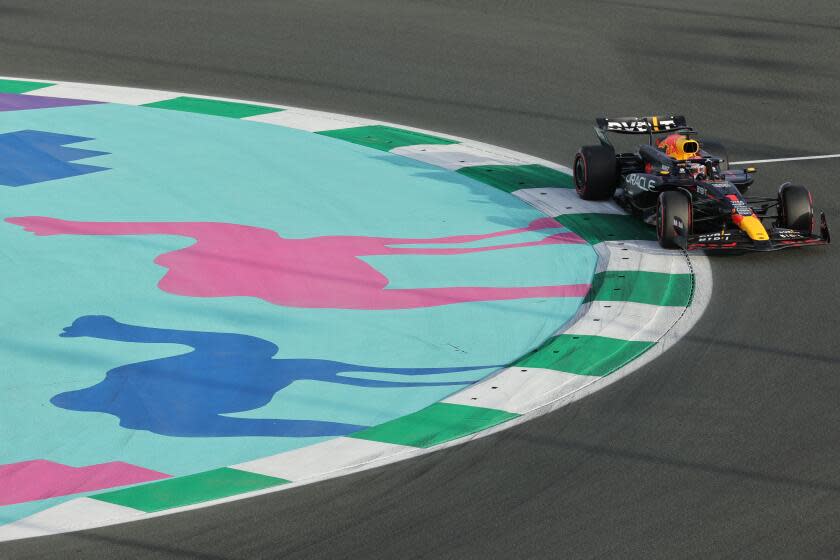
To understand the scope of Saudi Arabia's ambitions in the sporting landscape, don't look just to this spring's Formula One race in Jeddah — which ended with a predictable one-two win for the Red Bull team. The revealing action was at the after-party.
Amid a bloom of fireworks over Jeddah's coast, dozens of drones buzzed in synchronicity to spell out the kingdom's goal: "Saudi Arabia. Home of Sporting Events."
It's a vision that increasingly seems within reach. Backed by funds from the state-owned oil giant Aramco and the vast endowment of its Public Investment Fund, the autocratic monarchy has in only a few years steamrolled its way onto the sporting world's most hallowed grounds.
In soccer, it has lavished its local clubs with hundreds of millions of dollars, courted superstar players to its league and successfully lobbied to host the 2034 World Cup. Its bid to create a rival golf tournament rattled the genteel PGA enough to force it into a reluctant union. Tennis, boxing, cricket, pro wrestling, even eSports — all have been rocked by the sheer scale of investment the kingdom is wielding to transform itself into a sports and entertainment powerhouse.
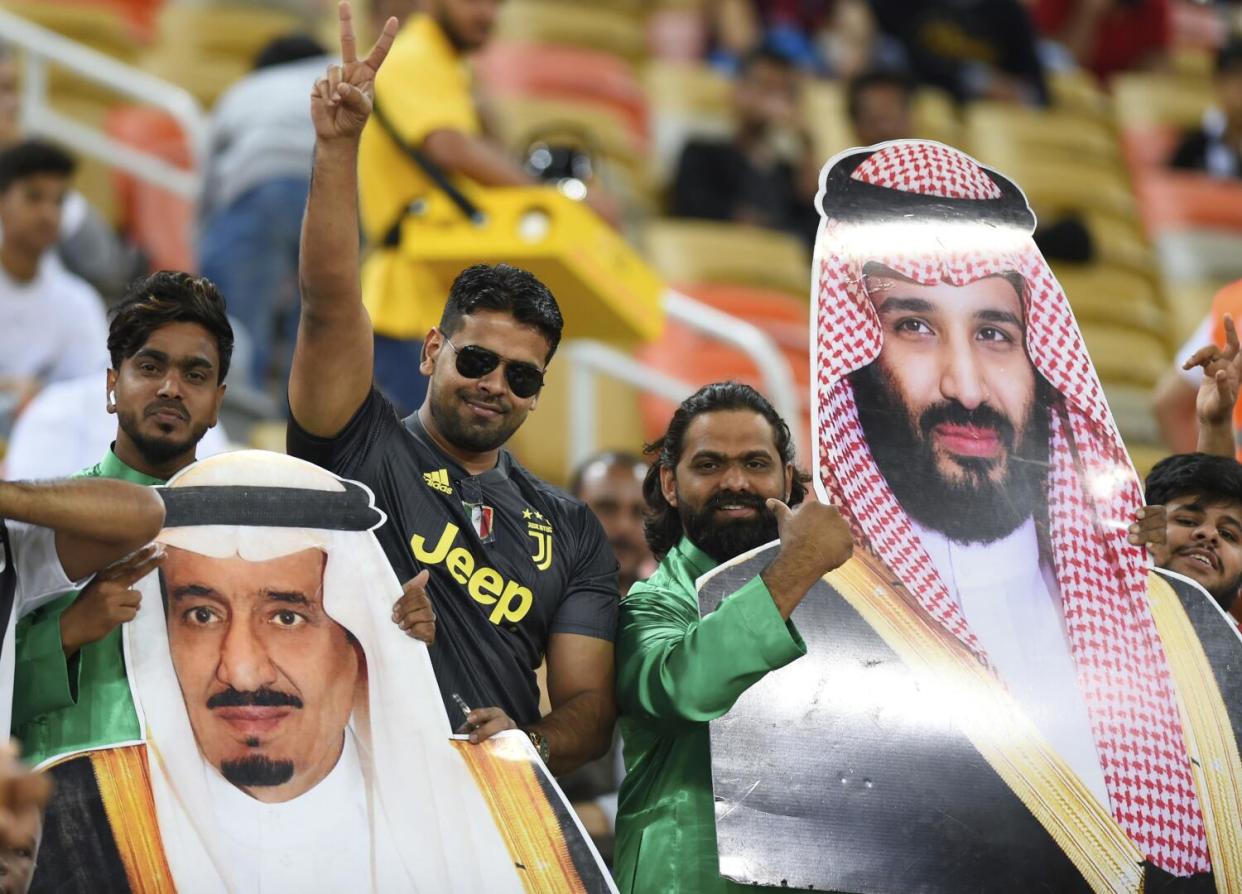
But it is in motorsports, and Formula One in particular, where Saudi Arabia has made some of its most audacious and expensive moves, outpacing its regional rivals — Bahrain, Qatar and the United Arab Emirates, all host F1 races — amid a wider push to establish the Gulf as a racing hub.
“It’s amazing what they’re doing here,” said Jefferson Slack, commercial and marketing director for Aston Martin Aramco.
"No county in the world is investing in motorsports as much as Saudi Arabia."
Slack would know. An executive with three decades of experience in sports investments and management of athletes such as Michael Jordan, he joined the team before Saudi Arabia came on board, when Canadian billionaire Lance Stroll bought the defunct Force India Formula One team and rebranded it as Aston Martin in 2021.
Since then, Aramco, the kingdom's flagship oil company, has plowed money into the team, while the Saudi Public Investment Fund increased its stake in car manufacturer Aston Martin to more than 20%. As of January, Aramco became exclusive title sponsor and is signed on as a strategic partner until 2028. Rumors abound that Aramco may try to buy the team outright.
Critics charge that the massive investments are an attempt at "sportswashing," calculated to distract from an abysmal human rights record — imprisonment and violence against commentators and activists, travel bans, and male guardianship laws over women.
The kingdom says it is merely modernizing and diversifying its economy, with F1 as an eager partner. Less than two years after Saudi henchmen killed and dismembered a Saudi Washington Post columnist and monarchy critic, the F1 and the kingdom’s flagship oil company entered into a 10-year partnership deal.
The deal, which began in 2020, is believed to have cost the Saudis some $45 million a year. Some whisper it’s only a matter of time before Saudi Arabia bids for the race series franchise as a whole, which Liberty Media Corp. bought for $4.6 billion in 2017 and whose valuation has since risen many times over — in no small part because the Netflix series “Formula 1: Drive to Survive” has supercharged the sport’s international popularity.
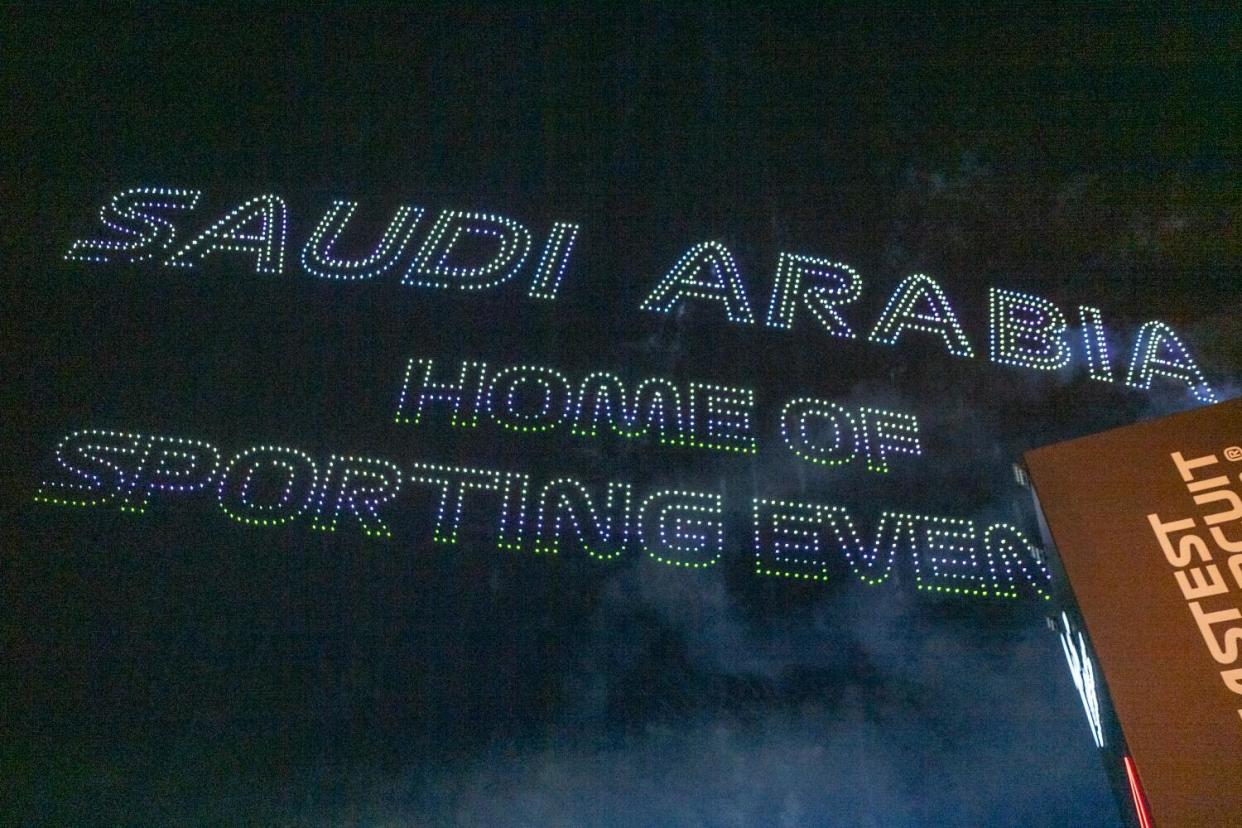
In addition, there's a half-billion dollar racing circuit under construction in the city of Qiddiya, a mega project near the capital, Riyadh, intended to be part city and part tourism, sport and entertainment zone.
Plans are also in place to develop racing at a grassroots level, said Martin Whitaker, head of the Saudi Motorsports Company, the PIF-owned commercial entity charged with bringing motor sport events to the country.
"We've raised the bar in how the sport is seen globally," he said. "Now we have to produce a concrete set of foundations and platforms so we can build it here."
Creating that sort of ecosystem for racing is harder than it sounds. Soccer for example, can be played just about anywhere: Find an empty lot or quiet street, use whatever is available for goalposts, and that's largely it.
Racing on the other hand requires infrastructure and major investment. Starting a pipeline of kids in karting — the gateway into circuit racing — can be painfully expensive; move up the ranks to the higher classes and you're looking at $80,000 a race.
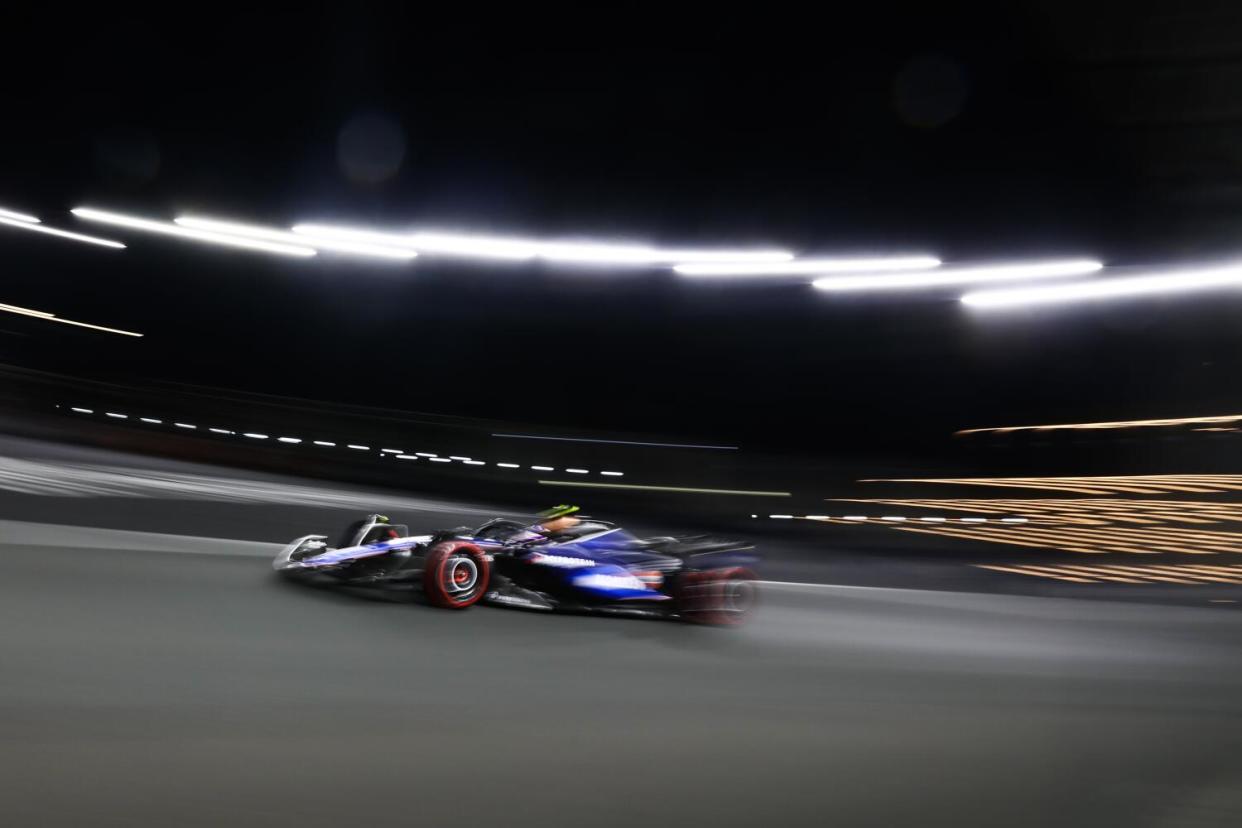
Without serious sponsorship, drivers have little hope of sustaining a career, restricting the sport to what Mercedes driver and F1 superstar Lewis Hamilton (who comes from a working-class background) said in 2021 was a "billionaire's boy's club." Even with that advantage, the odds of getting a seat in an F1 car are astronomical.
One afternoon this spring, visiting journalists were given a tour of a new regulation karting circuit in Jeddah — the first of its kind in the country that could host internationally sanctioned events. The idea, according to Prince Khaled bin Sultan Al-Faisal, chairman of the Saudi Automobile and Motorcycle Federation, was to have many more such circuits across the country, with a focus on drawing children as young as 5.
"We've hosted events and championships, but we have to focus on the sport itself and serve its practitioners, and start with a young generation. A circuit like this is the first step," he said, adding that he was expecting a 15- to 20-year-long timeline before a Saudi F1 driver appears on the grid.
Whitaker, standing nearby, said it wasn't just about finding drivers of the future.
"It's engineers, technicians, placing kids with internships with other teams, talking to international teams to base themselves here," he said.
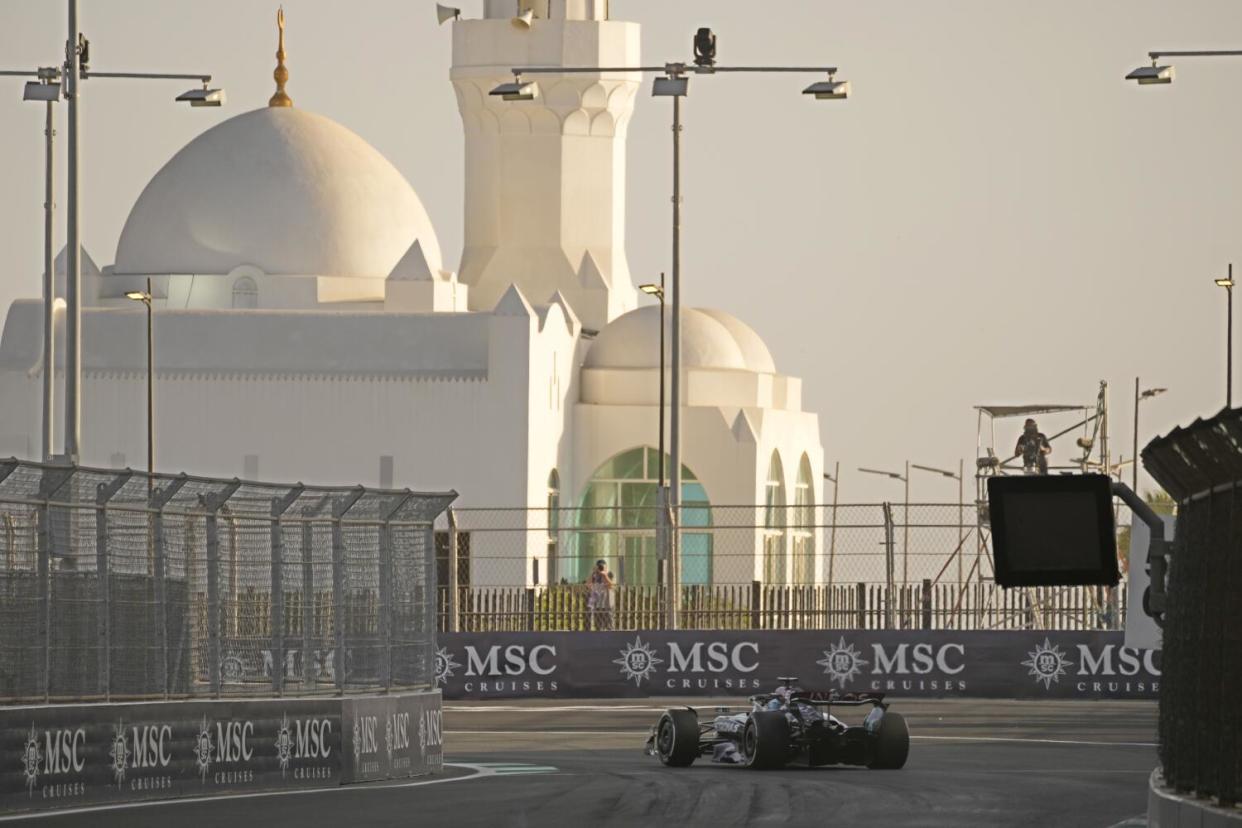
"It's developing career paths for young people."
That puts the endeavor in line with Vision 2030, Crown Prince Mohammad bin Salman's all-encompassing plan to diversify the oil-rich kingdom's economy and change its reputation from strict religious realm to tourism and sports hot spot, all while providing jobs for young Saudis.
But first you have to get people interested in F1.
::
Soccer remains far and away the most popular sport in Saudi Arabia and throughout the region, but Liberty representatives have identified the Middle East as one of F1's fastest-growing markets.
About a third of F1's roughly 1.55 billion fans worldwide became interested in the sport in the last four years, according to Salesforce data. Meanwhile, analysts at the World Economic Forum predict sport industries in the Middle East to grow by 8.7% in 2026 — more than double the global average.
The region, meanwhile, has gone all-in with Formula One. Races in the Gulf bookend the season — Bahrain in the beginning, Abu Dhabi at the end. The Gulf region is home to four races, the second most after Europe's nine.
At F1's top administrative levels you find Emirati former rally driver Mohammed Ben Sulayem heading the Federation Internationale de l'Automobile, or FIA, the sport's governing body. Bahrain's Sheikh Abdullah bin Hamad bin Isa Al Khalifa serves as the FIA's vice-president of sport for the Middle East and North Africa.
::
Almost anyone who attends an F1 race, if they're honest, will tell you it’s easier to understand what’s happening if you watch it on TV. But it’s not just about who’s leading the field.
In Jeddah, the rich and connected watch the race from the premium lounge, with a commanding view of the track and “grazing tables” loaded with precision-prepared pastries and concoctions such as caviar cheesecake. Extra perks include traversing the pit lane as the teams prepare or paddock access, all the way up to meet-and-greets with F1 ambassadors. The price tag on that sort of package? $13,999.
In the cheap seats — which at a cost of at least $200 for a three-day pass are hardly cheap and allow only the occasional glance at the cars as they scream by — the fans didn’t seem to miss the caviar cheesecake.
Before the Jeddah race, a DJ bounced among fans, riling up the crowd with impromptu quizzes or throwing F1 merch, and some of the drivers passed by and signed shirts. Above, the Saudi Falcons, the country's jet aerobatics team, roared back and forth over the circuit.
Even in the stands farther from the track the sound of an F1 car is a multisensory affair: speed takes on physical proportions, the engine roar passes through your body.
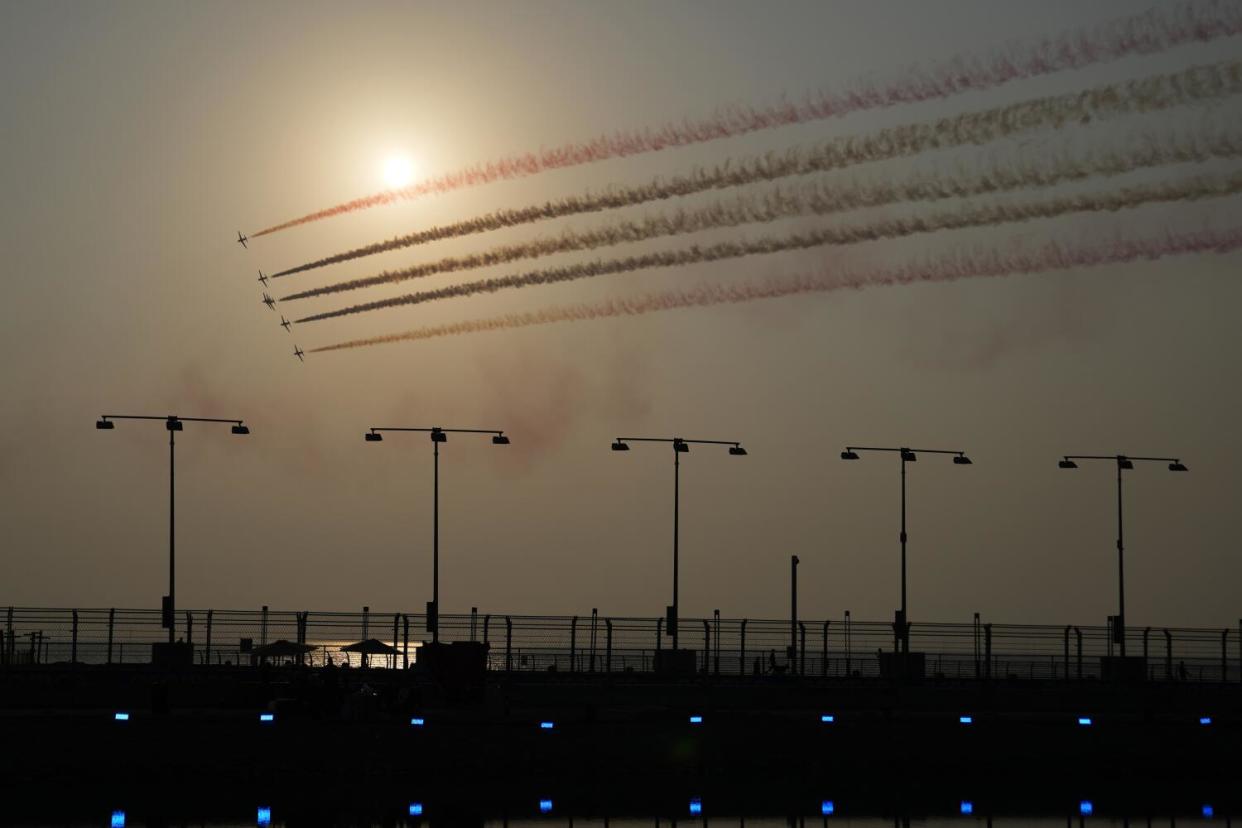
"My friends and I are really into it. In my community, at least, there are a lot of F1 fans," said Sireen Fataani, a 16-year-old wearing a Ferrari jacket. Beside her was Ibaa Qattan, also 16, and her sister, Shumookh Qattan, 22.
The three were walking around the pit lane after one of the non-F1 races at the track that weekend, gazing at the cars and hoping to catch a glimpse of some of their favorite drivers — McLaren’s Oscar Piastri for Sireen, Mercedes’ George Russell for Ibaa, and McLaren’s Lando Norris for Shumookh.
"I wanted something to be obsessed about one summer, and for me it was F1," Ibaa said.
She insisted she didn't get into it because of "Drive to Survive." "Too much drama," she said dismissively.
Both of the teens were enrolled in "F1 in Schools," an Aramco-sponsored program that has students establishing and managing their own racing team as part of STEM and other lessons. Ibaa had taken on the role of head engineer for her team, while Sireen was doing marketing.
"Ours is called Fennec," she said. "It's a desert fox that lives in Saudi Arabia."
: :
Not everyone is convinced that the region's plans to build up its racing bonafides are a good thing.
There have been grumblings over how the infusion of Gulf money has changed F1. Hosting a race is prestigious and a calling card for countries, but the high fees — Saudi Arabia pays an estimated $55 million for the honor — mean storied tracks in Europe (where the most die-hard fans reside) have to compete in ways they didn't before, and without the coffers of a petrostate backing them up.
Aside from the fees, tracks such as Belgium's Spa have been forced into upgrades and expensive face-lifts or risk being dropped from the F1 calendar.
Corruption charges have also been leveled at the FIA's leadership under Ben Sulayem. He was accused in March of trying to block the Las Vegas circuit from being certified ahead of last year's Grand Prix. That followed a previous accusation that he had interfered in the 2023 Saudi Arabia Grand Prix in favor of Aston Martin. The FIA's ethics committee cleared him of both charges.
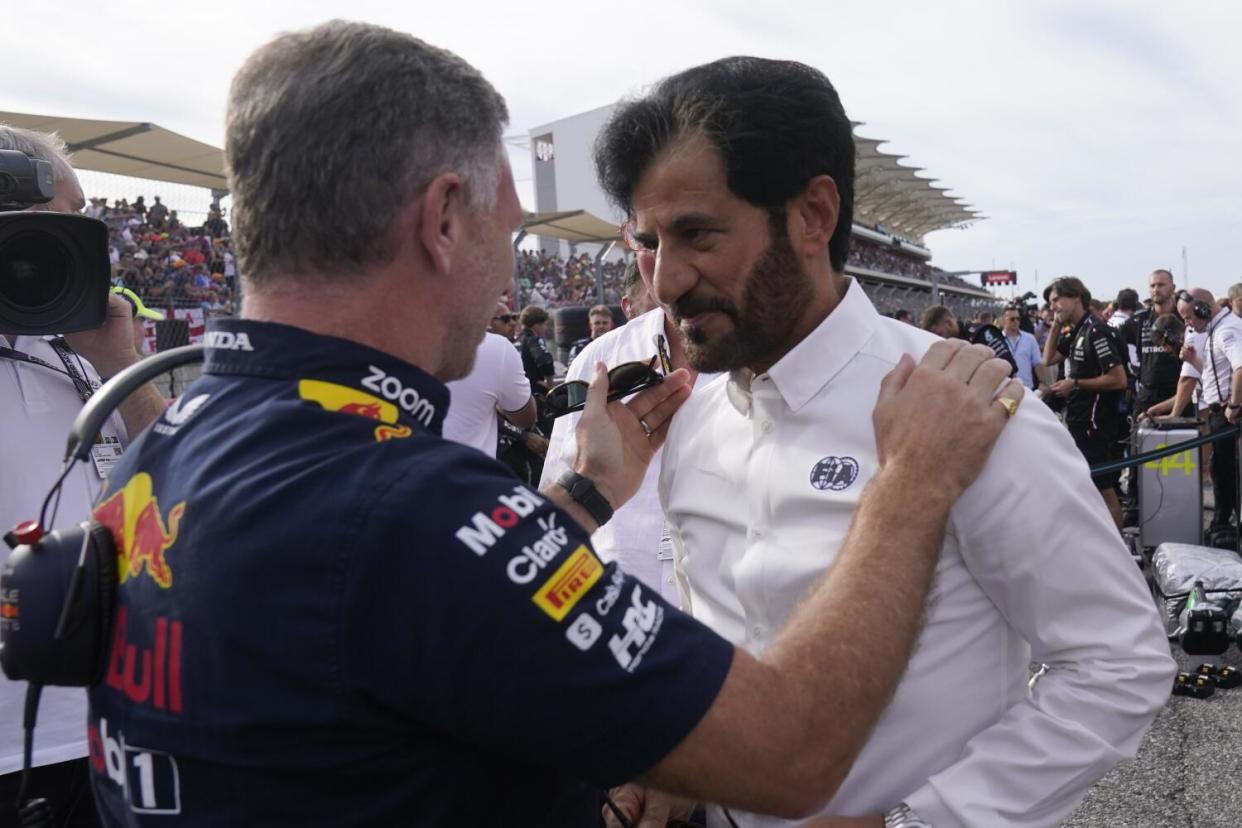
And then there are the accusations of sportswashing, as wealthy nondemocratic countries try to lure more sporting events to the Gulf.
During the last soccer World Cup, host Qatar, which had already bought the French team Paris Saint-Germain, was accused of trying to launder its repressive reputation. The monarchy's human rights record and labor rights nevertheless edged into the spotlight.
Saudi Arabia's efforts in soccer, Formula One and golf, among other sports, have kicked up similar criticism as Saudi money has continued to flow.
"The leaders of these autocratic nations strategically utilize sports, leveraging major events such as Formula One to operate beyond the conventional political stage," said Stanis Elsborg, a Danish researcher with Play the Game, an initiative to promote democracy and transparency in international sports.
"While immediate changes may be subtle, the long-term ownership by an autocratic state poses substantial threats to the sport's integrity and introduces conflicts of interest."
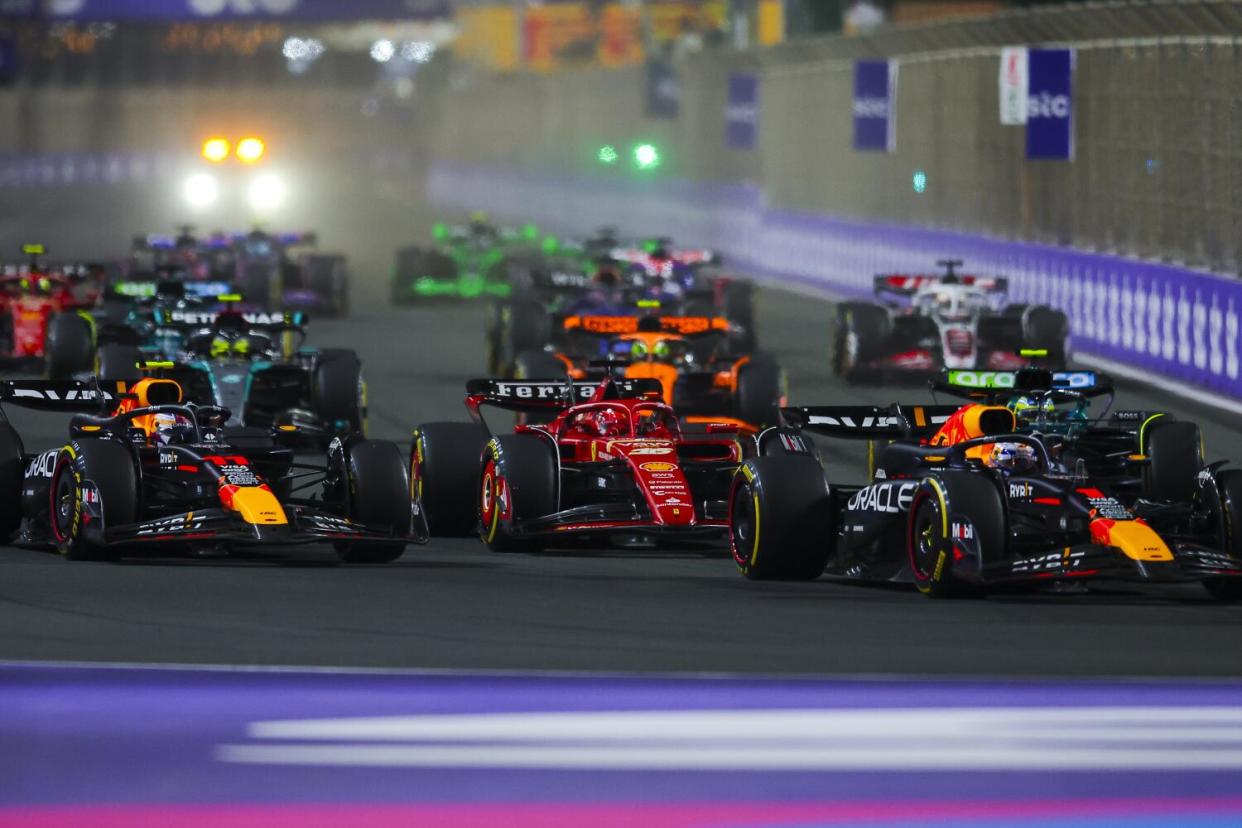
Others allege that Saudi Arabia is leveraging its influence on F1 officials to have them lobby governments to weaken legislation that curbs usage of internal combustion engines and fossil fuels.
"If your goal is to diversify into other industries, it's a little inconsistent that your sponsorship is all about the oil business," said Frank Huisingh, founder of Fossil Free Football, a campaign organization that aims to remove high-polluting companies from soccer sponsorship.
"They need to work on their image to keep selling a product that is becoming very unpopular but also because they're a country with a bad reputation for both human rights and climate reasons."
In an interview with Fox News in September, Bin Salman dismissed such accusations, insisting his main concerns are domestic growth.
"If sportswashing is going to increase my GDP by way of 1%, then I will continue doing sportswashing," he said.
"I don't care... I'm aiming for another one-and-a-half percent. Call it whatever you want, we're going to get that one-and-a-half percent."
In that same interview, Bin Salman expressed shame at the country's repressive laws, but said that dozens of laws had been amended and that he was "trying to prioritize the change day by day,"
"Do we have bad laws? Yes. Are we changing that? Yes," he said.
F1 portrays its involvement in Saudi Arabia and the Gulf in general as a driver for that change. During the race weekend, F1 Academy, an all-women's race series and training program run by Scottish former racing driver Susie Wolff, had its season opener in Jeddah. Wolff called the event "iconic."
"I think to open here in a country where just six years ago women couldn't drive really shows incredible progress," she said at a panel on sports' role in Saudi Arabia.
"Sometimes in life, you have to see it to believe it. And we are out there to show that this sport wants to provide opportunity to women and wants to make the sport more diverse in the long term."
Drivers were also encouraging.
"We are not going to change the world at the end of the day as a sport, but we try to share positive values. And then, of course, it's also up to the country to make positive changes," Max Verstappen said at a post-race news conference. The Belgian-Dutch Red Bull driver added that he had already seen change in the kingdom and that it was a "work in progress."
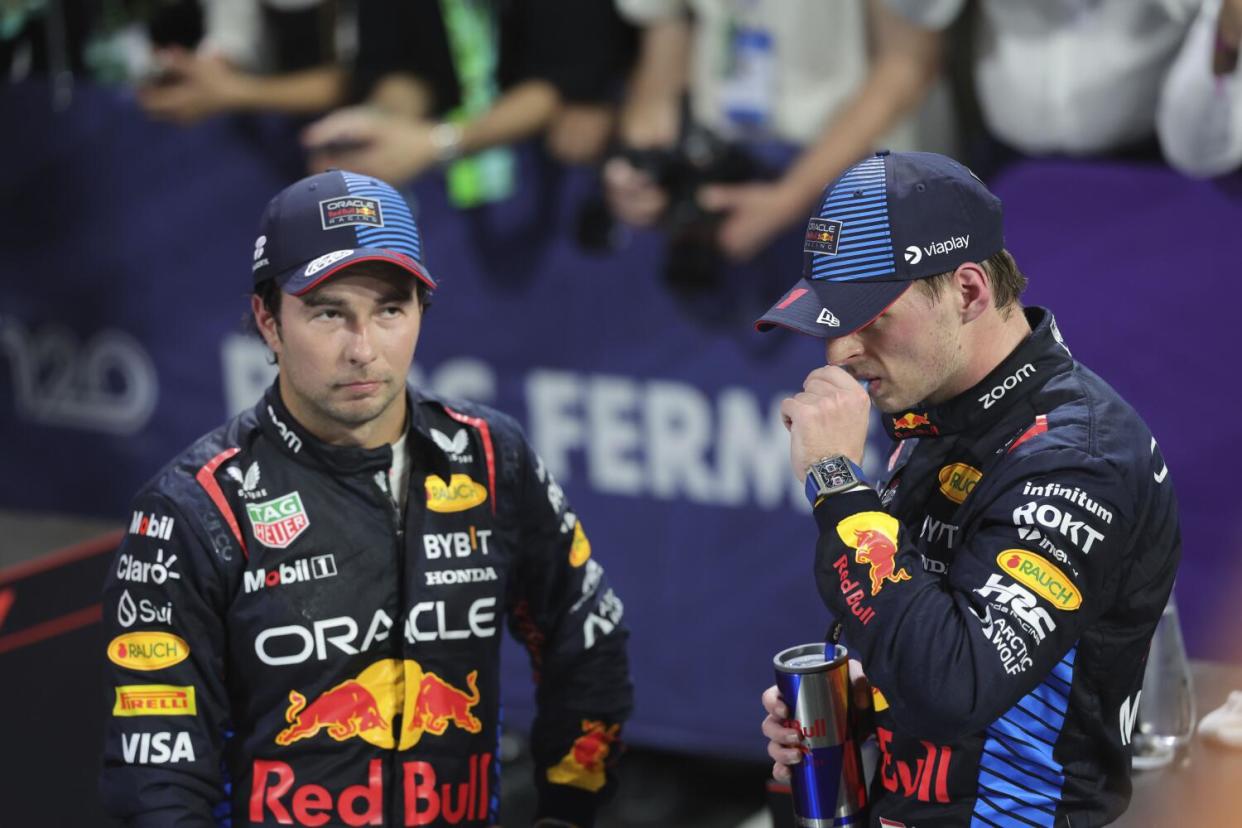
Ferrari driver Charles Leclerc, who is from Monaco, said F1 needed to go to different countries "in order to hopefully open minds." Red Bull driver Sergio Pérez said it was important to expand beyond its traditional areas.
"I feel like in the past, Formula One was very centralized in Europe, not just with drivers, but also the people working in the paddock," said Pérez, who is from Mexico, adding that now there were more nationalities at different levels of the sport.
::
Some in the Gulf are already on the yearslong journey to score a place on the F1 grid.
Sisters Amna, 24, and Hamda Al Qubaisi, 21, started karting in their home country of the United Arab Emirates as children with their father's encouragement and are now part of F1 Academy. In 2021, Hamda became the first woman to win a podium finish in the history of the Italian F4 series.
When they started competing in races, they'd hear grumblings and anger from the Gulf region.
"In the beginning people were very unsupportive. They didn't like the fact there was a girl competing in a male-dominated sport. We'd hear 'Women belong in the kitchen. Women aren't supposed to be playing a sport, they should focus on studies or something else,'" Amna Al Qubaisi said.
Now "everything switched, and people are happy and supportive of what we're doing," she added.
Their racing careers have encouraged other women and girls, Hamda Al Qubaisi said. "They tell their father 'Amna and Hamda are racing,' and then he says 'Why not?'"
"Every time we go back to visit our karting team, we're seeing it grow more and more with girls from the Middle East, which makes it even more special."
When Saudi Arabia's first female racer, Reema Juffali, 32, got her first regular driver's license while studying in the U.S. in 2010, women in the kingdom weren't allowed behind the wheel.
Seven years later, King Salman, Bin Salman’s father, issued a decree overturning the ban on women driving. That same year, Juffali — then working a finance job in the U.K. — got her racing license, the first Saudi woman to do so. She made her professional debut at the TRD 86 Cup in Abu Dhabi in 2018 — the same year the kingdom began issuing driver licenses to women.
Nearly six years later, Juffali sped through the turns in front of a home city crowd in the first F1 Academy race in Jeddah, also a significant and emotional milestone for her.
"I've been wanting to be able to share what I do with my friends, family, fans, people who have never really been able to come to my races," she said.
But while there is progress on the track and some restrictions against women have been eased to much fanfare, women in Saudi Arabia are far from enjoying equal rights. Under the patriarchal government, women need a male guardian's approval to get married or divorced. They are required by personal status laws to obey their husbands, and the law places fathers as the default guardians for children, among other limitations on women.
And though women are now able to drive, one activist who campaigned to overturn the driving ban is still caught up in Bin Salman’s crackdown on dissent.
Loujain al-Hathloul, who was imprisoned from 2018 until 2021, remains barred from leaving Saudi Arabia. Manahel al-Otaibi, 29, another women’s rights activist who had spoken in favor of Bin Salman’s reforms but called for more change to the male guardianship laws, was sentenced in January to 11 years for what the government labeled “terror offenses.”
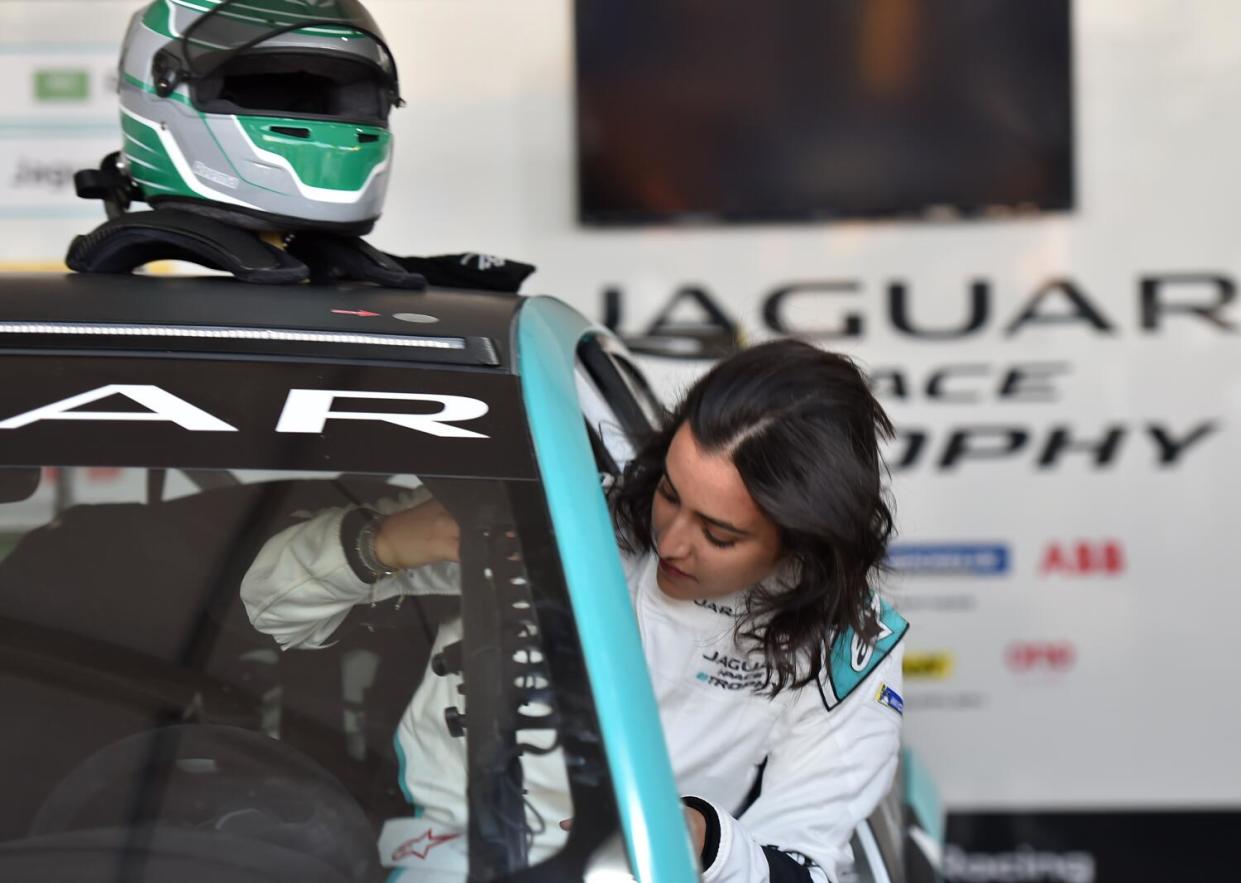
Though Juffali acknowledges the criticism of her country, she says people need to come to Saudi Arabia and see the changes happening themselves.
“We’re not just advancing on sports, which speaks to me personally, but also to see young people who are so much more ambitious, so much more hungry and happy — I feel that when I’m here,” she said.
Juffali aims to boost Saudi participation in racing through the team she founded, Theeba Motorsport, named for her childhood nickname, which roughly translates as "she-wolf." She hopes Theeba will become the first Saudi team to compete in the 24 Hours of Le Mans.
“The aim is to one day be a Saudi team — not just drivers, but mechanics, engineers, for all facets of the team be Saudi,” Juffali said.
“These events we have, they’re for Saudis as well. This is serving a bigger purpose than anyone realizes.”
This story originally appeared in Los Angeles Times.
